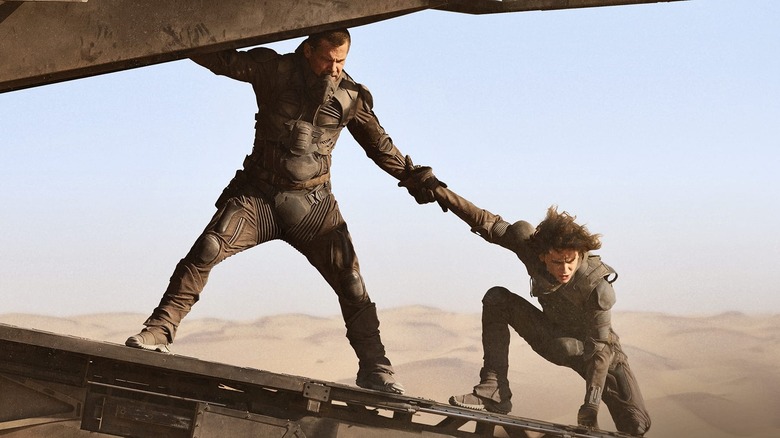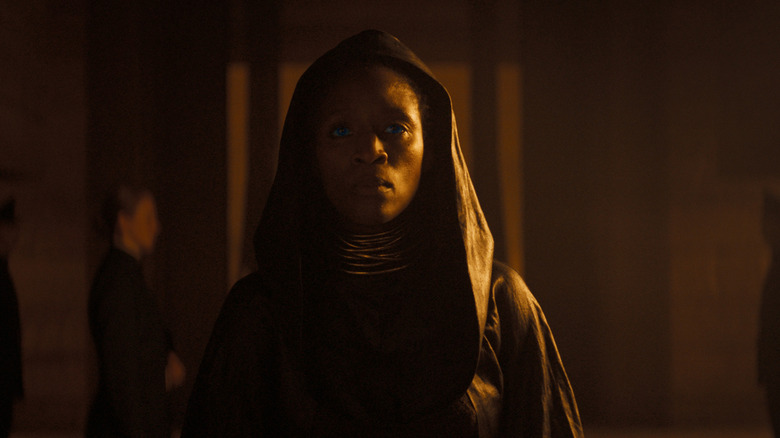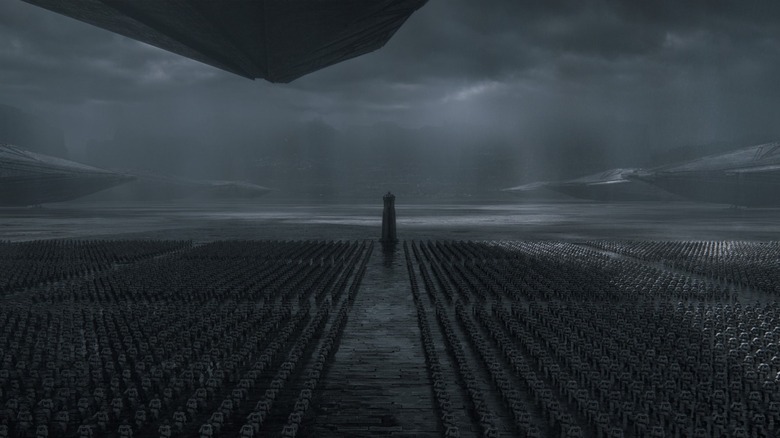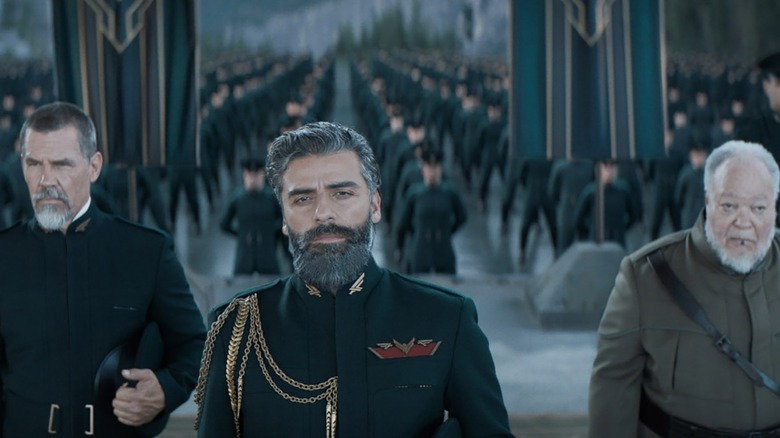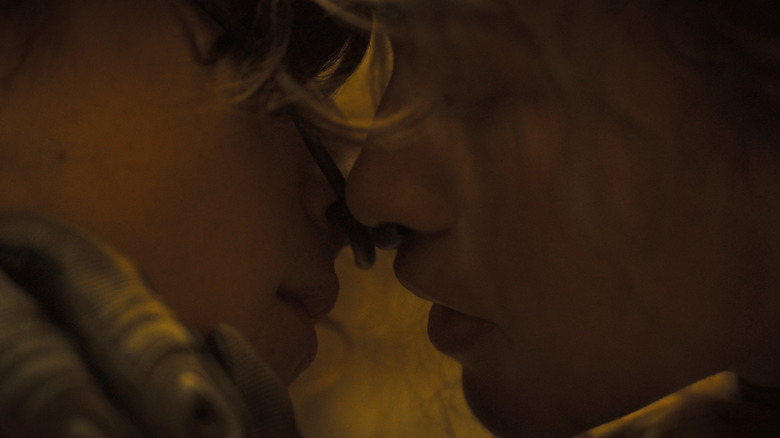Biggest Unanswered Questions In Dune
Discounting the two miniseries Syfy aired in the early aughts, Denis Villeneuve's ambitious and mega-budgeted "Dune" is the first time the influential science fiction saga has been adapted for the screen since David Lynch's much-maligned take on the material in 1984. But even after the Covid delays — and now making its debut on HBO Max concurrently with its theatrical debut — "Dune" is an incomplete event, more a promise of a future complete story than a satisfying experience all its own. Onscreen the film is titled "Dune: Part One," and it covers a little less than half of the book's story across its two-and-a-half-hour runtime.
It's an understandable conundrum, given the relative density and narrative depth at play within the source material. But as efficient and economical as the film's sturdy screenwriting from co-writers Jon Spaihts, Eric Roth and Villeneuve himself can be, there is still a lot to keep track of — in terms of character, motivation, mythology, and more. This sprawling saga about the planet Arrakis and its would-be savior Paul Atreides (Timotheé Chalamet) comes complete with a plethora of supporting players and exotic, intergalactic locales to be familiarized with, such that by the time the credits roll and the story more or less pauses until an eventual sequel, there may be a lot left to unpack.
So, knowing there's going to be some heavy spoilers ahead, we're going to try to address the many unanswered questions left in the film's wake. Some of these, we must assume, will be answered in a potential "Dune: Part Two," but should this film underperform theatrically, perhaps they'll just make for fun watercooler talk — or better yet, even more reason to finally crack the spine on that "Dune" paperback you've left sitting around for too long.
Who else survived the fall of House Atreides?
Around the film's extravagant midway point, when the Harkonnens have laid slaughter to House Atreides with a dual pronged attack and help from the Emperor's warrior force the Sardaukar, the final fate of several characters remains left open. Duncan Idaho (Jason Momoa), Paul's trainer and friend, survives the battle and makes it out alive to help Paul and Lady Jessica (Rebecca Ferguson) make it to safety. But what about the rest of House Atreides' high-ranking men?
There are two prominent figures we never see in the aftermath of all that carnage: Gurney Halleck (Josh Brolin), the weapons master, and Thufir Hawat (Stephen McKinley Henderson), the Mentat, or advisor, to Duke Leto Atredies (Oscar Isaac). Those familiar with the source material know both men survive, but with differing paths from this particular catastrophe.
Halleck survives the battle and becomes a smuggler, disillusioned by what has transpired and mistakenly thinking Lady Jessica was in some way responsible for Duke Leto's death. But Hawat is kept on by the Harkonnens to replace the recently deceased Piter De Vries as their new Mentat, a position he uses to undermine their regime from within.
But that is, of course, assuming Villeneuve, Roth, and Spaihts plan to keep things as close to the novel as possible, and with this film's domestic box office still up in the air, who knows whether that sequel will come — and if it does, if it'll continue being faithful to the source material.
Will we see more of Dr. Kynes' backstory?
In "Dune: Part One," Dr. Liet-Kynes is portrayed by Black actress Sharon Duncan-Brewster in one of the film's more affecting individual performances. Though the character is canonically male in the source material, this iteration is not drastically different outside of gender, especially considering that, within the context of the film, there are no overt changes made to how the character is presented or interacted with. Introduced as an objective observer of the regime change between the Harkonnens and House Atreides, it becomes clear that while Dr. Kynes is loyal to neither opposing force, she is also not exactly loyal to the Emperor, instead considering herself a Fremen first and foremost.
In the novel, Kynes is presented with an almost secret identity-like stature as a dual persona, with Dr. Kynes being the planetologist Duke Leto meets with, and "Liet" being a name spoken of as someone the Fremen show close allegiance with. But Villenueve's film doesn't have room for those narrative complications, instead positioning Dr. Kynes as an impartial emissary of the empire whose heart belongs with the native people of Arrakis, who worships Shai-Hulud, and who has a murky, unexplored past with a Fremen lover who died.
But one key element missing from this film is that Dr. Kynes has a child, Chani, a Fremen played by Zendaya in the film. Chani doesn't appear onscreen until the film's final act, only showing up throughout in Paul's visions of the future. Dr. Kynes seemingly meets her fate, being swallowed up by the great sandworm before the film's last act begins in earnest, so we never see any interaction between her and her would-be daughter.
It remains to be seen if a "Part Two" will follow up with this information, or perhaps even delve into Dr. Kynes' origins as a half-Fremen as outlined in Brian Herbert and Kevin J. Anderson's "Prelude to Dune." Perhaps this genealogical tether might be abolished altogether in an effort to streamline the rest of the book, which is just as dense and nuanced as this half we've seen brought to life. Time will tell...
Why, Emperor, why?
One side effect of cutting the book's plot in half: One of the key figures in the "Dune" mythology, the character who sets everything into motion, is completely absent from "Dune: Part One." The Padishah Emperor, Shaddam IV, previously played onscreen by Jose Ferrer in David Lynch's 1984 version and Giancarlo Giannini in Syfy's 2000 miniseries, is nowhere to be found, only alluded to as the catalyst for replacing the Harkonnens on Arrakis with House Atreides. Likewise, his daughter, Princess Irulan, also a key figure in the plot, has yet to be cast or seen either.
It makes sense to not bother casting actors for parts that won't have much dialogue until a potential sequel, especially since, tonally, this isn't the kind of film that would function properly with fan-service post-credits sequences. But in having to sideline the Emperor, the motivations for his political machinations and betrayal of Duke Leto has to be casually abstracted down to petty jealousy at House Atreides potentially usurping his throne ... somehow.
It's not exactly as bad as another Oscar Isaac-led science fiction film where an Emperor's goals are murky at best, but it is one of the key issues with the plot and adaptation that makes releasing "Dune" on its own without the promise of a "Part Two" feel slight and slapdash. The novel possesses a great deal of nuance and intrigue that must be simplified for the logistics of the big screen and it leaves certain plot threads, like the entire political dynasty war side of the intergalactic spice trade, feel somewhat silly by default.
Come on, "Dune: Part Two." Papa needs some closure!
Why aren't Leto and Jessica married?
In one of the film's most touching sequences, not long before House Atreides suffers such heavy casualties, Duke Leto can feel the walls closing around him and he makes a heartbreaking confession to Lady Jessica. While she consoles him over the growing fears this move to Arrakis has been little more than a trap, he tells her how much he regrets not marrying her. Lady Jessica was a concubine, and a sister of the Bene Gesserit, so her siring a son with Leto was not a conventional or well-advised development. But he allowed her to raise their son and teach him the Weirding Way of the sisterhood, with Paul developing preternatural abilities in the process.
Knowing that in all likelihood, he's not long for this world, he asks her and the Bene Gesserit to protect his son, because he won't be around to do it anymore. But there's such a rueful, harrowing tenor to Isaac's last scenes as Duke Leto. His undeniable chemistry with Rebecca Ferguson as Jessica imply a deep, rich and storied love affair we the viewer, at least through this particular adaptation, can't be privy to.
While it isn't as essential to the plot as some of the other unanswered questions, Isaac and Ferguson leave the viewer wanting more of their history together, wanting to know what kept Duke Leto from making an honest woman out of Lady Jessica.
Will we even get Part Two?
It bears repeating that the biggest, most pressing unanswered question here is whether audiences will get to experience "Dune: Part Two" to finally receive the full adaptation of Frank Herbert's book. "Dune," as a cinematic experience, doesn't stand well enough alone as a island unto itself without its other half being greenlit down the line so the book will finally have a singular, probably five-hour-plus roadshow cut that can live on HBO Max or a limited theatrical run.
But even so, Herbert's original source material takes this saga even further into the future with two subsequent sequels, "Dune Messiah" and "Children of Dune." Villeneuve is on record as saying his plan isn't just an adaptation of the original book split in two, but rather a trilogy of films that would culminate in a third chapter with "Dune Messiah" serving as its own standalone film to conclude Paul Atreides' story. Syfy's "Dune" adaptations turn the latter two Dune novels into one single miniseries with "Children of Dune" taking on the material from "Messiah," but Villeneuve would go the other way with it, pausing at the end of Paul's arc, perhaps with the next book to be handed off to another filmmaker, should Arrakis-mania run wild enough to warrant further spinoffs.
We also still have "Dune: The Sisterhood," a prequel series about the origins of the Bene Gesserit, being developed and waiting in the wings. A lot is riding on this film's financial success. Above all else, the spice must flow.

